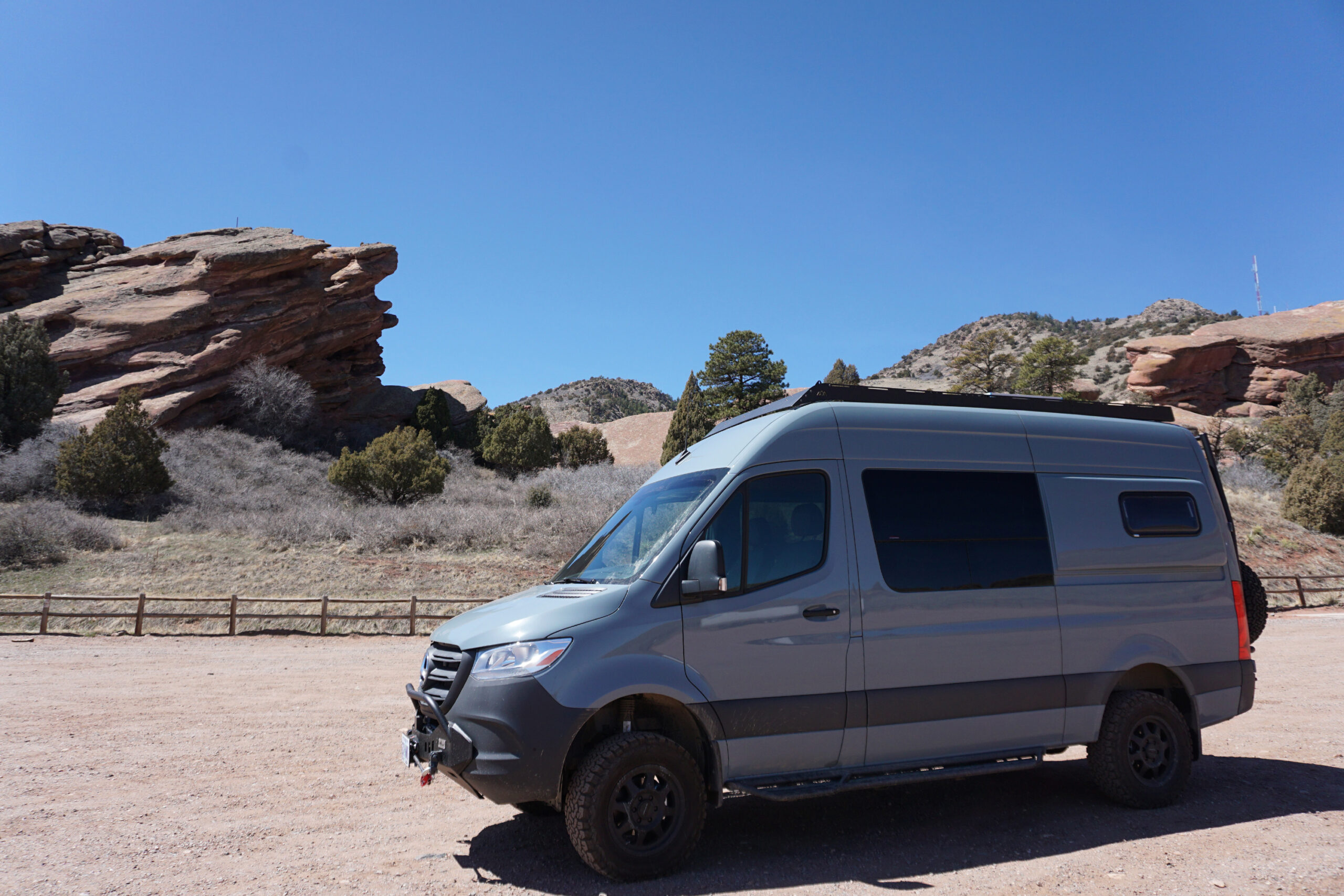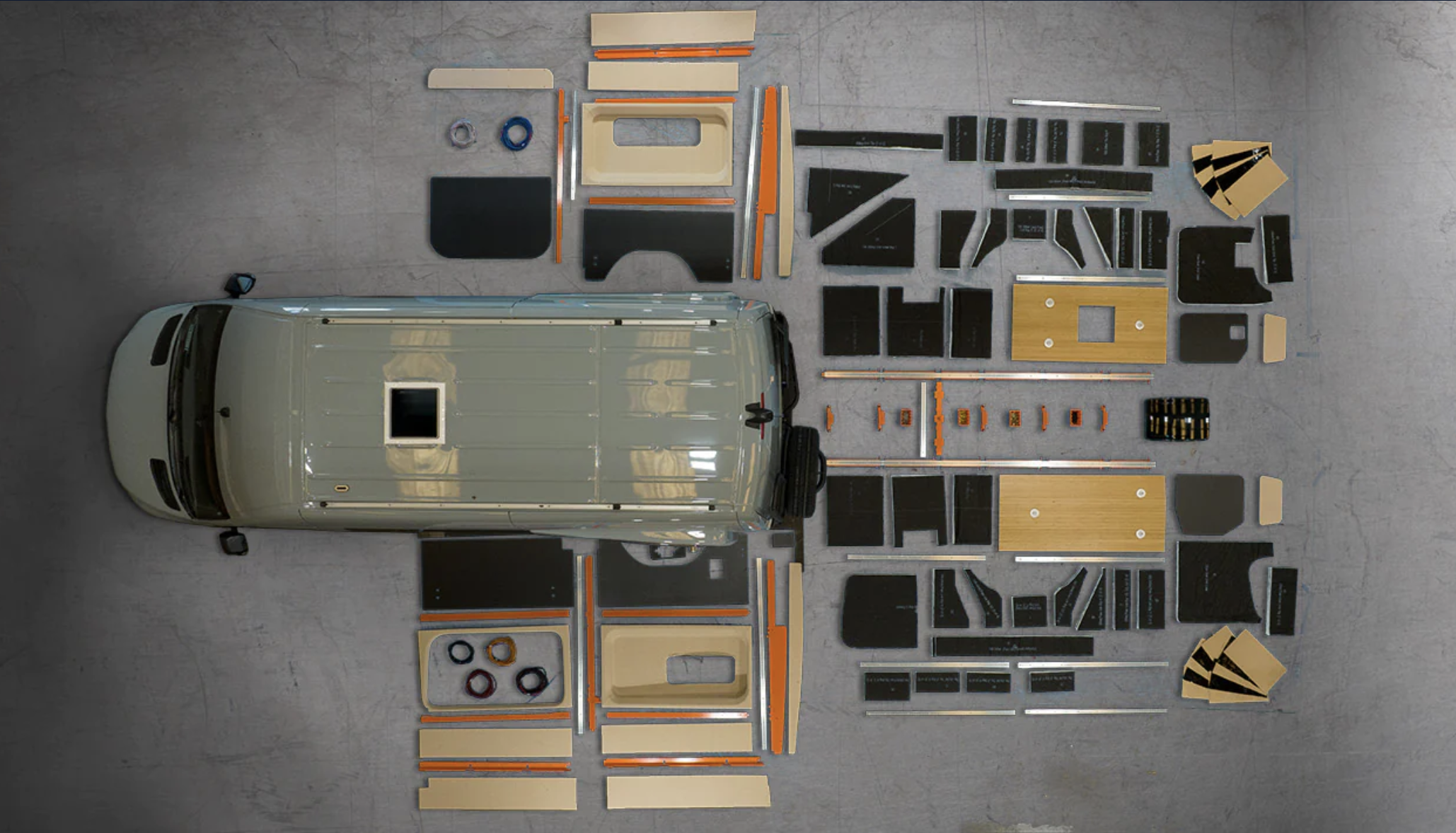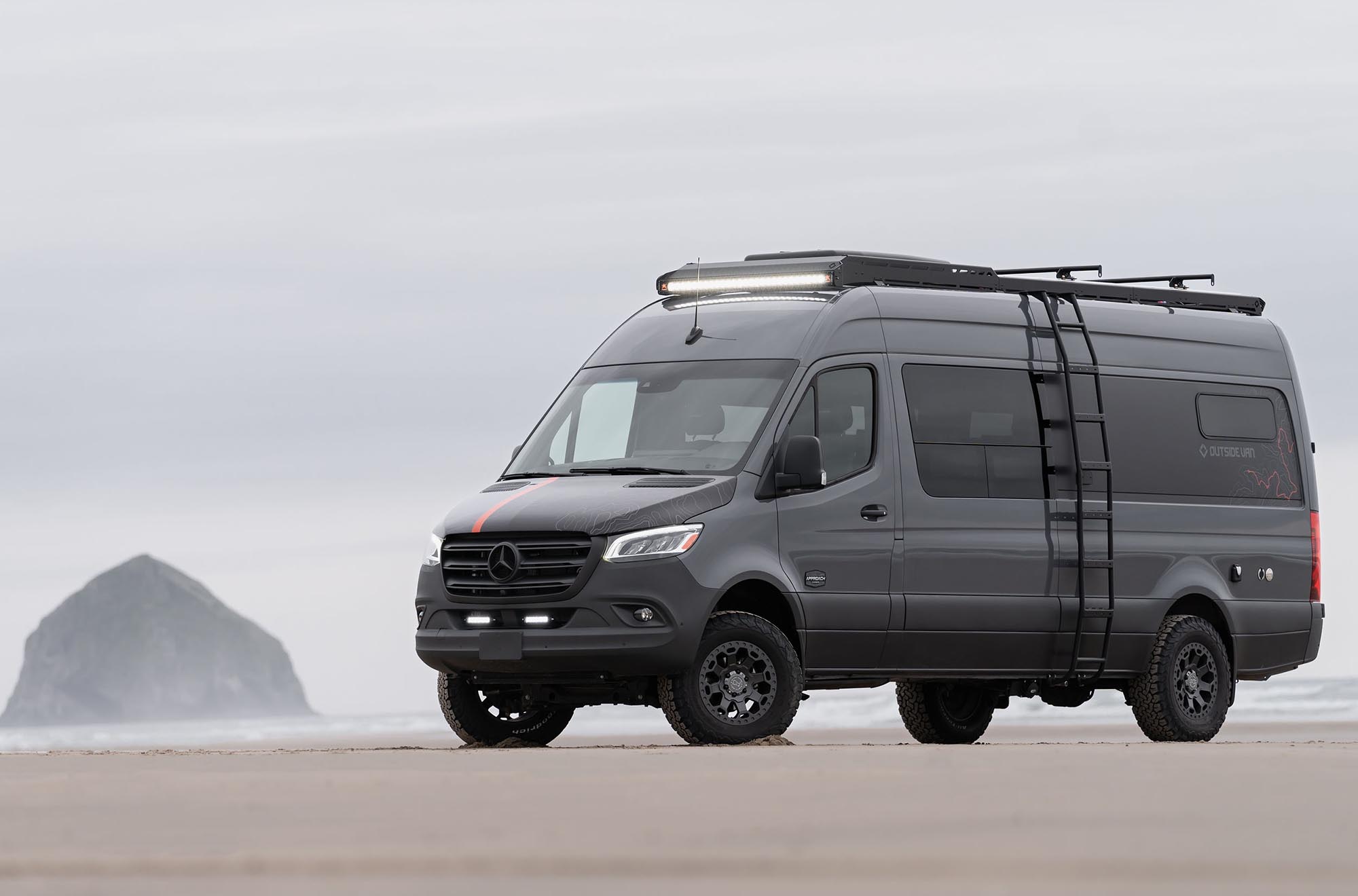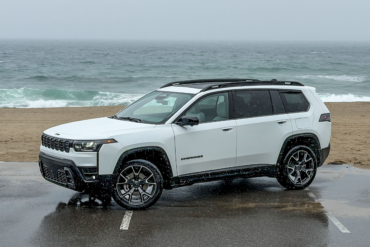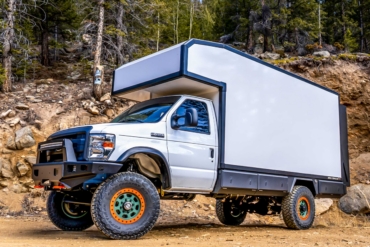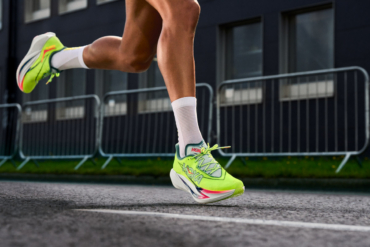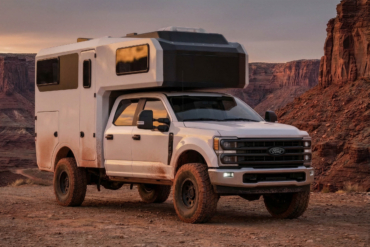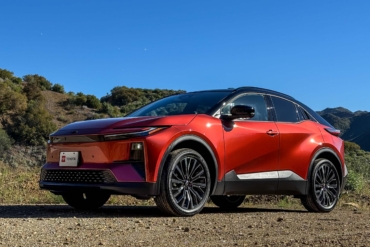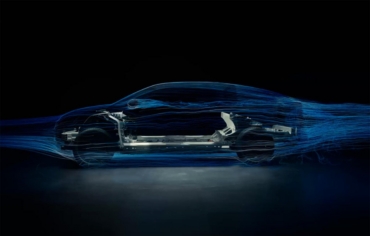I was just coming back down a long, winding trail hike west of town, when it began to rain. Thankfully, I only had a half mile to go. I checked the clouds overhead and sped up my pace. We, my pup and I, made it back to the van before the heavy rain set in. I knew we were dirtier (and wetter) than when we had begun. I clicked the key fob, rolled open the side van door, unfolded our towel “doormat,” and we hopped in.
This van is spacious. Like, there’s enough room to fully stand up, no problem, move around, shed layers, sit down, and towel off — again, myself and my dog. The van didn’t feel cramped, there was room. Which I feel is a bigger deal than it sounds when it comes to campervans.
I began hanging our wet layers on hooks, and putting our dry hiking gear and my pack away. I opened up one of the overhead bins, ahem, gear pods, and donned a light zip-up fleece. We had a dry haven in the storm where we could sit back, relax, and watch the rain (and then hail).
Ahhh. This isn’t home, but it’s close.
In short: For starters, yes you can live in this van. But it’s not designed to live in full-time. And yes, there’s a difference. What do I mean? It’s got a bed platform, some electrical (with fancy dimmable lighting), and solar, but mostly, it’s empty. “Empty” allows it to provide a lot of storage space to configure seats for travel, racks, and room for gear. It’s not built out with a kitchen and bathroom and a table and cupboards everywhere. Rather, the Adventure Wagon is meant for part-time, flexible travel — if you are someone who lives in the city, or maybe just wants to take the van out on the weekends, the Adventure Wagon is a great fit.
- Build: A-frame steel bracers, L-track system
- Paneling: plywood, bamboo, ABS molded plastic, or tweed upholstery
- Finishes: aluminum or anodized aluminum black
- Electrical: included electrical wiring harness, pre-measured leads, USB and 12V outlets, red/white dimmable LED lights
- Climate: 3M thinsulate insulation, diesel heater, front and rear fans
- Add-ons: bed platform and mattress, Mule bags, gear tray, ski rack, additional seats, overhead driver cockpit storage, MOLLE door panels
- —:
- Vehicle Specs:
- Engine: 4-cylinder AWD, 9-speed automatic transmission
- Fuel Tank: 24.5 gal diesel
- Gross Vehicle Weight: 9,050 lbs
- Towing Capacity: 5,000 lbs
- Additional components: tow package and wench, electrical-wired hitch, tire mudflaps, spare wheel, hydraulic jack
- Tech: 7" display screen, 360 degree backup camera, blind spot detectors
Pros
- Super versatile
- Modular
- Easy to install add-ons
- Adjustable bed height is awesome
Cons
- Make sure you choose the right track system configuration for the floor depending on your needs
- No swivel seats
2023 Adventure Wagon Mercedes Benz Sprinter 4×4 Review
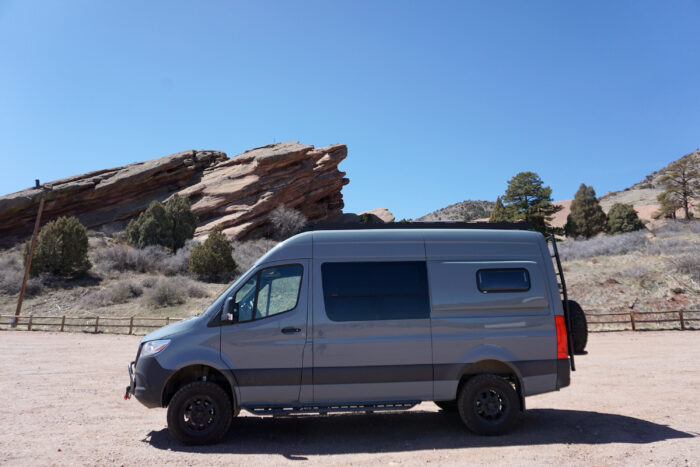
Adventure Wagon: Brand Mission, Modular Designs
The Adventure Wagon I tested was a 2023 Mercedes Benz Sprinter 4×4 AWD, with the conversion from Adventure Wagon.
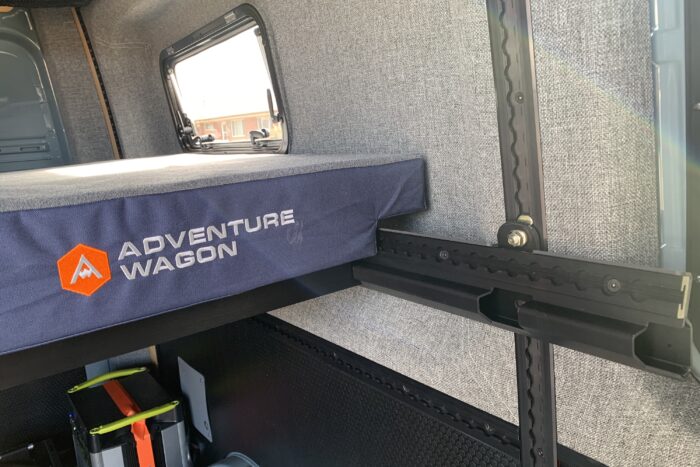
Customizations for the Adventure Wagon camper conversion include; various gear tracks, choice of bed platform configuration, choice of gear tray add-on, extra tracks, extra seats, refrigerator tie-down system, wall insulation and paneling, floor insulation, Espar diesel heater, ceiling fans, windows, upholstery, and various metal finishes.
And even though we were handed a vehicle straight from the Adventure Wagon Portland HQ, I actually went on the website and went through the entire build process to see what it would be like for paying customers. It’s easy to configure step by step, and the level of detail is impressive. The best part is, yet again, unlike many campervans, is that many of the build choices you have to make are not permanent — they are all modular pieces in the package.
If you don’t already have a van to upfit, Adventure Wagon has a van purchase program to help you out.
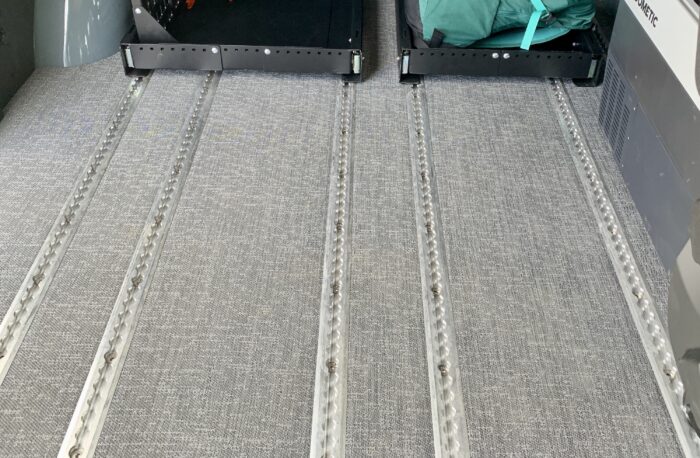
Things like the bed type (bunk or double) and configuration (long ways or wide) you won’t be able to change, but you can change the bed platform height to whatever you need at the time, like to fit more bikes, or if you want it lower for kids when in camping mode. Same with the extra seats, gear pods, and any of the rack or accessory add-ons — I highly recommend opting for a few you’ll think you’ll need, and you can always remove them when not in use.
Finally, with the 2023 Adventure Wagon Sprinter 4×4, you can opt for factory installation (5-day timeline at the Adventure Wagon HQ in Portland), through a certified installer, or DIY.
Put to the Test: Camping, Hiking, Skiing, and Climbing Basecamp
For a part-time van, “basecamp,” gear-hauling vehicle, Adventure Wagon really nails it. There’s no toilet or shower, galley kitchen. Nothing you don’t need. There’s no clutter (OK, built-ins) and that means so. much. room.
The Adventure Wagon is much more than just a shell of a van. It’s got lots of usable, modular potential. It’s not like the typical, modern-day van builds we all see so often. In Colorado, that’s a nice change of pace.
There’s electrical, there’s solar, and plenty of room to add a power station or more devices on board. In our van, we stashed a Dometic electric cooler, a water jug, and a Goal Zero power station to keep things running.
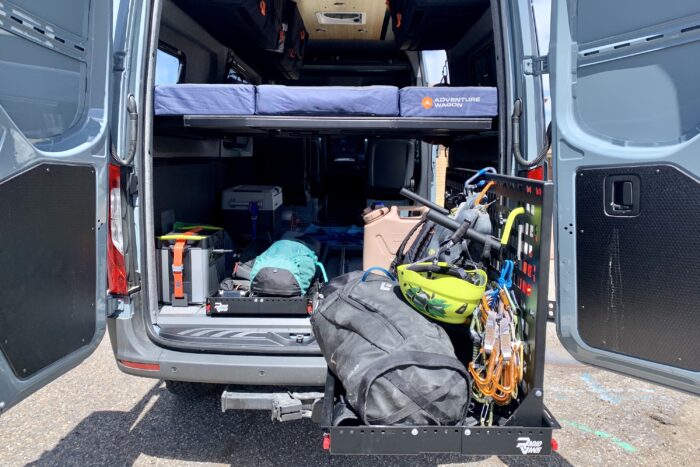
The best analogy I have for the Adventure Wagon is like the framing stage when you are building a house. All the bones are there, the structure. It’s standing. It’s starting to take shape. But you can also make changes and add as you continue building.
This is where Adventure Wagon’s modularity comes in. Thanks to Adventure Wagon’s build and installation of L-tracks, you can install or remove as much of the modular system as you want. Bike rack? Check. Ski rack? Check. Gear tray? Check.
And of course, if you are only planning on ever having two adults in the van (driver and passenger) you can choose not to add any extra seats. That being said, if you do opt for rear seats, they are easy to install and remove — in about 30 seconds.
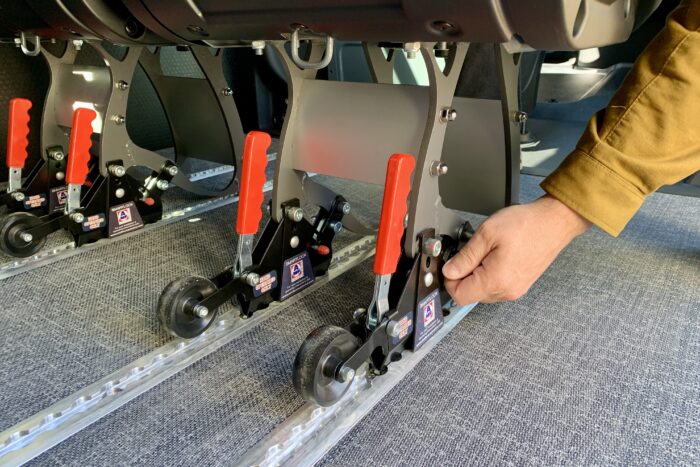
Modular Add-Ons
In just one week this April, I used every storage system feature in the Adventure Wagon, including the new-this-year ski rack (which can hold two pairs of skis or two boards, boots, and accessories), the gear tray, the extra passenger seats, and the brand’s “mule bags” (overhead soft-sided storage).
The Mule bags function like an overhead storage “locker,” similar to small closet cupboards you’d find in other campervan builds. A fantastic difference with these is that they are soft-sided, with mesh pockets on the sides and bottom, as well as lash points.
Even with just one or two of these bags installed, I found it super easy to stash, stuff, hang, and organize all my clothes and gear. They are also very easy to install/remove (there are six attachment points; three hand-turn knobs and three bolts requiring a 9/16-inch or 14mm wrench).
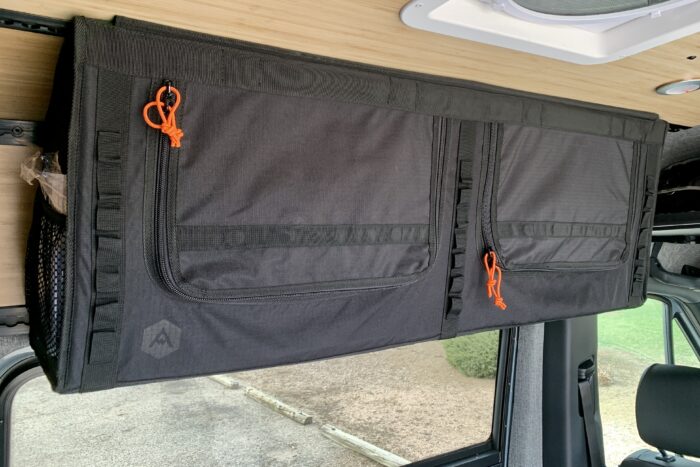
In addition, I spent one night on the Adventure Wagon Moab mattress, which measures 77 inches long by 65 inches wide and 5 inches thick — wider than a full-size mattress, but shorter than a queen. It was plenty comfy.
One feature I didn’t have on this van conversion (but is available) was the option of MOLLE door panels, which I imagine would add a ton of useful and quickly accessible vertical storage on the doors themselves, especially if you are overlanding. Or, if you are parking for a while and using the rear doors and gear tray set up as a bike shop, gear garage, or camp kitchen area.
Adventure Wagon Sprinter 4×4 Review: Conclusion
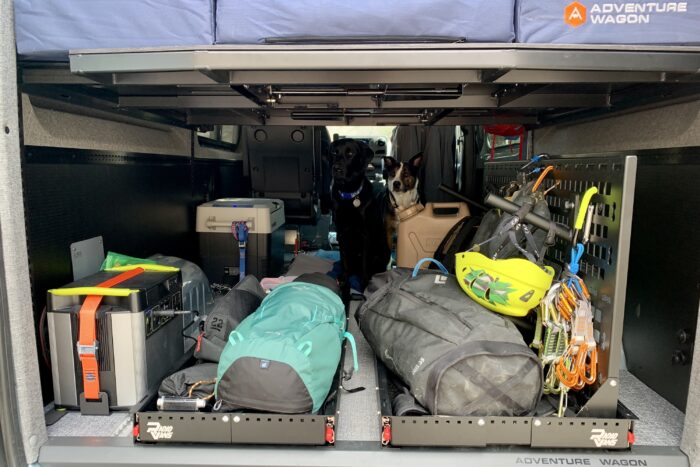
After 7 full days in this van, I was super impressed by its versatility. It can adapt to whatever the adventure at hand, wherever you’re going. It can (and I did) seat three-plus people, plus dogs. And unlike other van builds, it just felt so spacious. It’s everything I needed, nothing I didn’t.
Not to mention, driving on questionable old forest roads down to a trailhead, driving in the snow, and driving in the rain was a comfortable and assuring experience in the Sprinter 4×4. If you are looking for a truly unique and high-storage capacity campervan, the Adventure Wagon Sprinter 4×4 should get a spot on your list.
